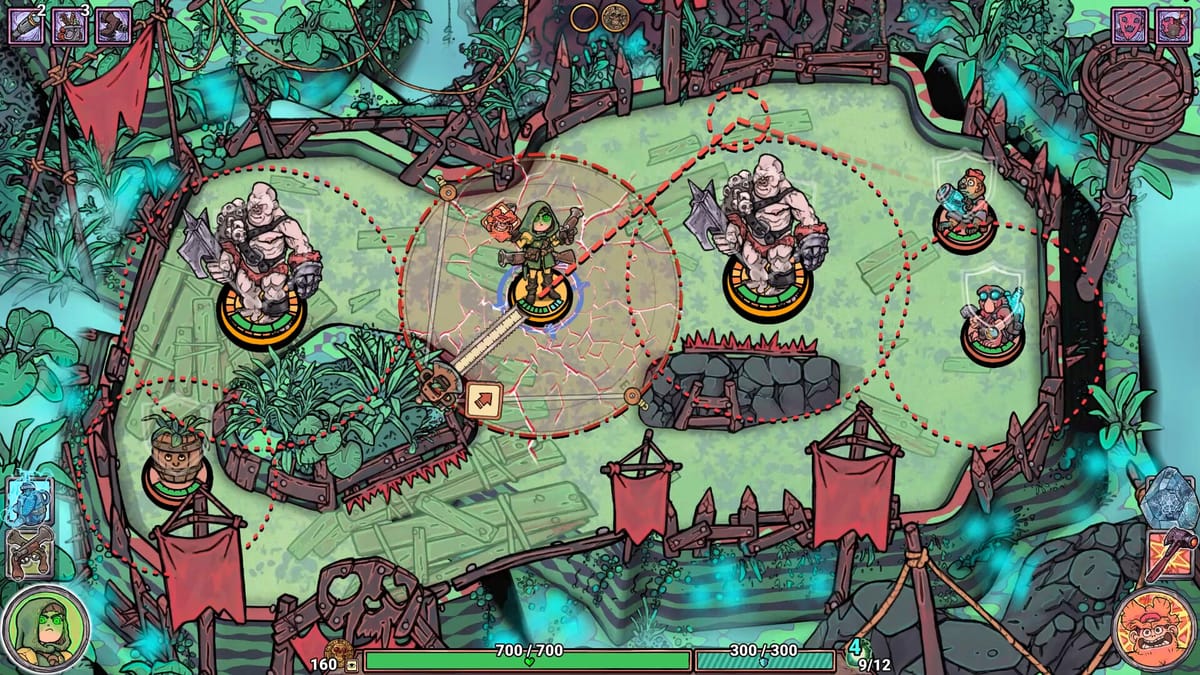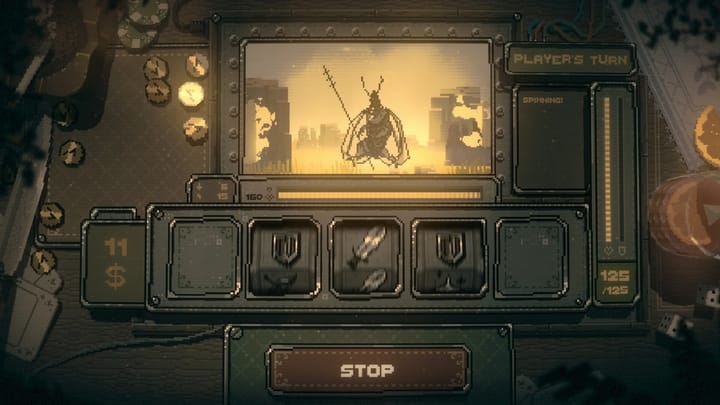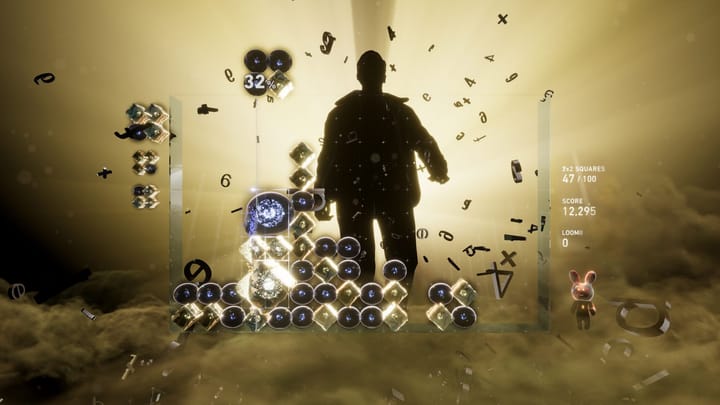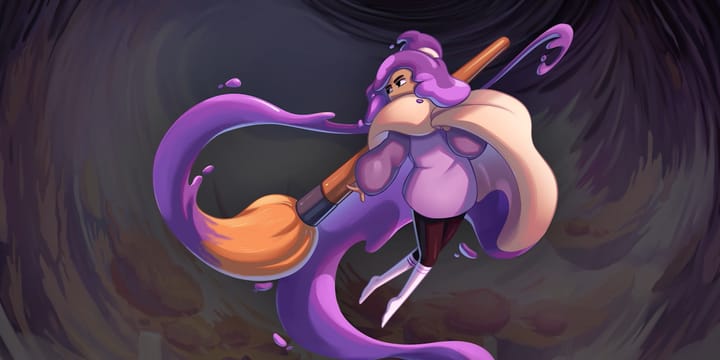Maybe it's the three word onomatopoeia-like punctuating effect these words have: fli-CK, sho-T, ro-GUES. Maybe it's the fact each of these words are consigned to a single syllable, thus rendering it a name you can quickly rattle off without having to concern yourself over its pronounciation. Or (perhaps the more likely possibility, all things considered) just maybe, it's the fact developer Butter By The Fish have landed with a premise for their own brand of strategy-laden roguelite – visually-novel it may be – of which doesn't feel like a distraction.
That underneath the attire and the aesthetic of static character stills being flung from one corner of an area to the next, there is some surprisingly enriching depth and appeal to this approach. It helps that as an avid lover of billiard sports – snooker and of course pool of both US and UK variants – the sight of opportune sight-lines, getting one's angles right and the resulting ricochet as a certain character hurdles towards its desired target, appeals to me. Making sense of the chaos that may or may not be administered, no matter the number of [planned] steps one is aiming to think ahead on.
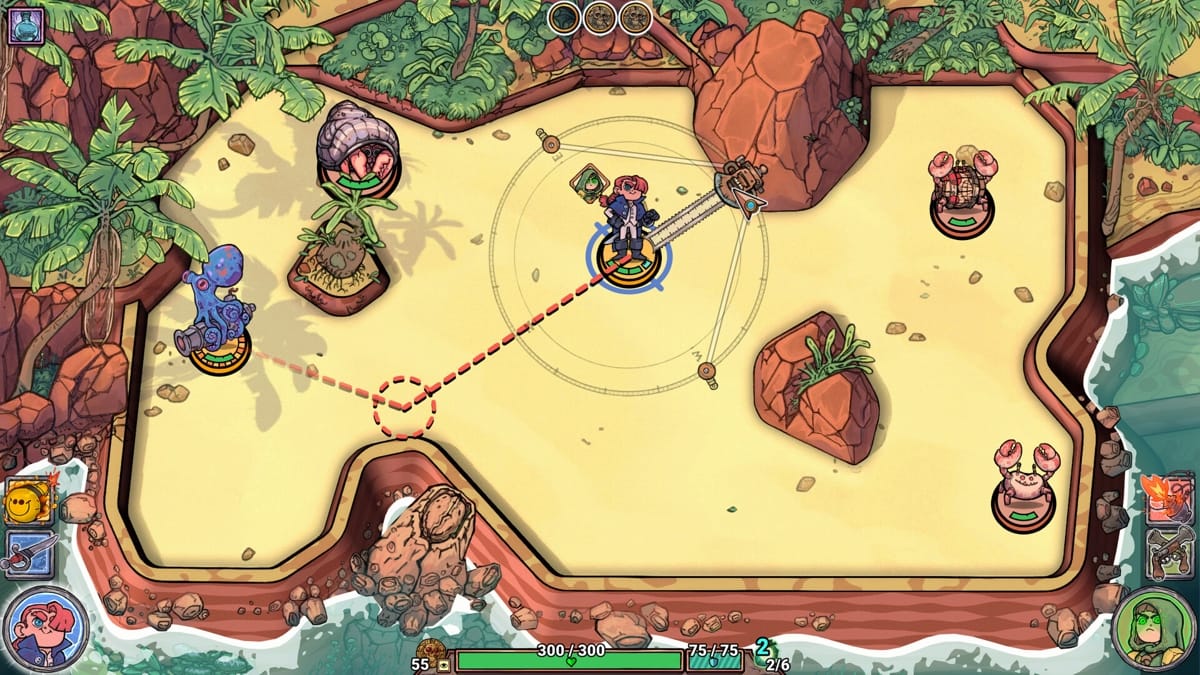
At its heart, Flick Shot Rogues is as traditionalist an incrementally-progressing roguelite, as one can be. Enter a stage/level scenario, win, move forward by which one ocassionally has to make a decision on which branching path to follow. In certain scenarios, the opportunity to add to/alter one's abilities; at others, the implied benefit, or at the very least, alteration to proceedings, isn't so clear-cut. Do you take the risk, or do you confide in what you already have and know?
Yes, this all sounds relatively formulaic; it's not all that different from your litany of ample rogue-affiliated releases that have come to define the independant space over the last five to ten years. Progression is, though certainly not a dissuasion, a fairly routine component. It's during battle – playing/manipulating the still frames of characters and monsters alike – where Flick Shot Rogues has garnered this surpringly spotlight-worthy mention. How this combining of strategic planning and billiard-like revelling in the aftermath of one's decisions – both good and bad – incurs just as much a giddy response when things don't go according to plan, just as much as when they do.
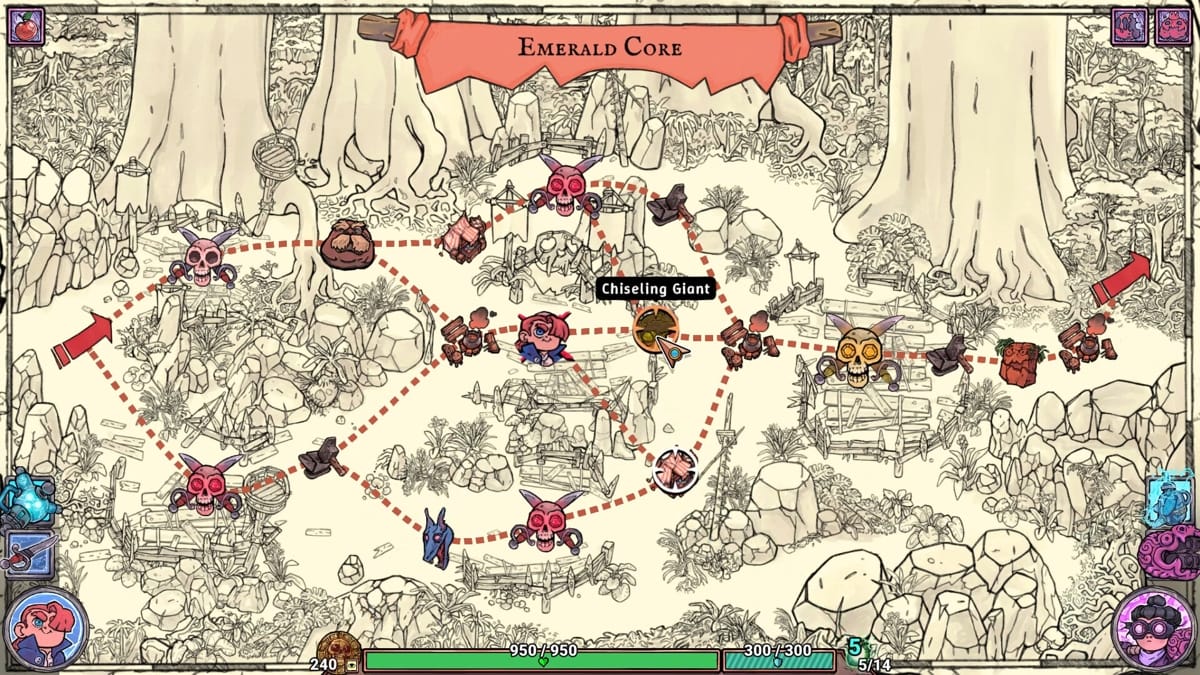
When a game can illicit satisfaction in both scenarios, that's often a promising sign that its gameplay structure is doing something right. And it's due in large part to Flick's slingshot-like inputting of commands, as to why this occurs. Damage inflicted, primarily coming by way of knocking into an opponent. Subsequent damage coming should said enemy or monster collide with another. Get flung into a wall adorned with spikes and that's another slither of damage to add on top.
Naturally, the strategic element comes by way of players deciding when best to target specific enemies. Elite-level foes administering turn-specific attacks with varying sizes of proximity, represented by the circular red line surrounding them. The key to victory as a result, isn't so much an emphasis on attack, but more so positioning. Not least when scenarios get even more crowded and the billiard-like chaos that all these pieces colliding with one another can incur, snaps back into focus.
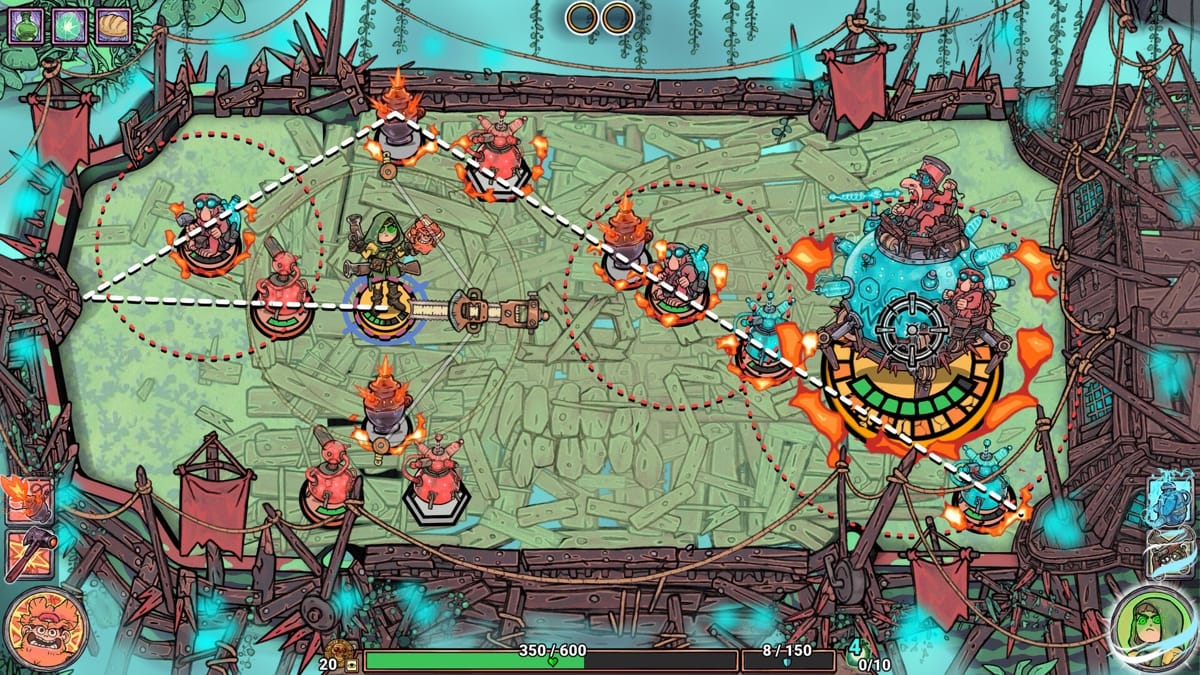
In fact that grappling with the butterfly effect-like consequence of one specific move/trajectory over another, comes into maximum view come the game's more major "boss battle" encounters. Enemies of much larger size, a multitude of attacks at their disposal and situations that have their own slingshotting strikes taking up far more of the arena space. To the point that, oddly enough, Flick Shot Rogues briefly transforms into a sort of bullet-hell fight for survival. Players glimpsing the tiniest slither of safety that should (in theory) guarantee next-to-no damage incurred, come the enemy's turn.
But again, there are no absolute guarantees and it's this wrestling with the chaos of so many pieces, all knocking into and colliding with one another, that gives this game's brandishing of chaos, an air of delight. Not just because certain enemies can inadvertently damage each other (though that is certainly a beneficial tool to consider), but moreso the figurative distance one must go to attain victory, isn't so clear-cut. When scenarios can give off that air of potentially flipping from possible to impossible and back again with a mere flick of a unit, it paves the way for some truly miraculous emergent moments to spring up.
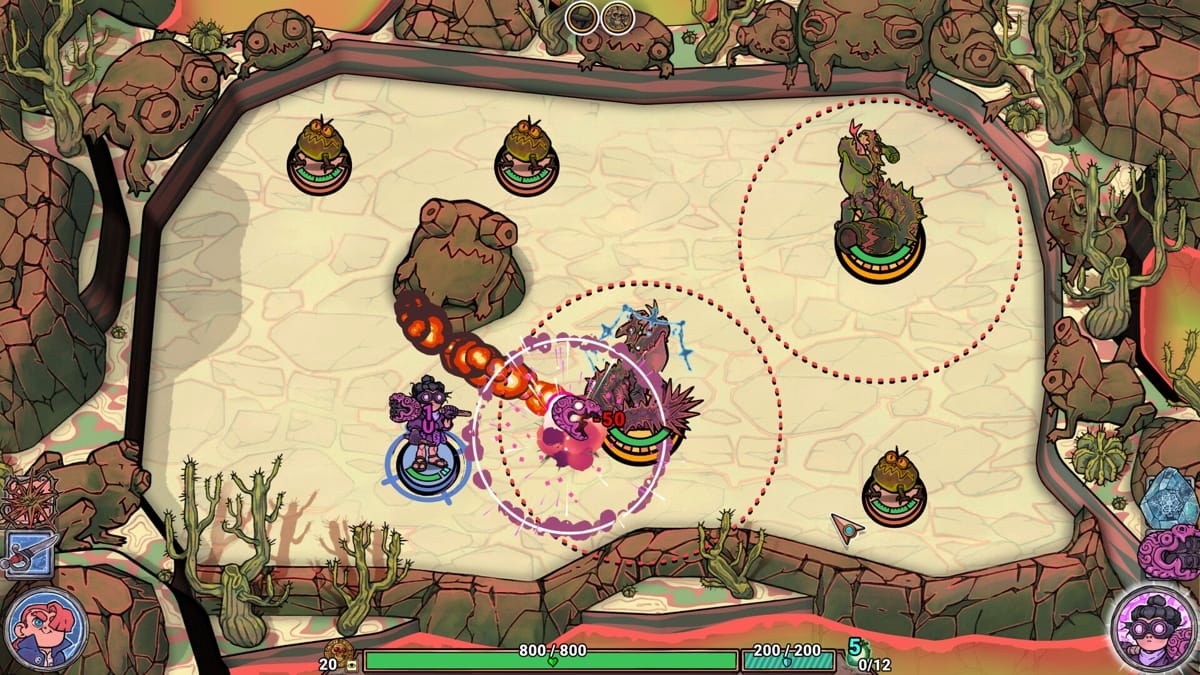
And while that's not to say that further stages and later-game scenarios may not dabble in such, it's pleasing to find a game like this that decides against the necessity for some complex or multi-floor structure with its arenas. An odd environmental clump or two – adorned with some damage-inflicting hazard or otherwise – the only real differentiating factor between levels. But it needn't be anything more; Flick Shot Rogues' collision-based gameplay is clearly the focus here. It's because these levels are so laid bare that allows the flurry of characters knocking into each other, to flourish. Defense, indeed that tactical retreat of sorts to shield one's self from an incoming collision, becoming a more prominent strategy, for the very simple reason that there will likely be so few opportunities to do so.
It's for these reasons – this less is more approach to a bevvy of design decisions – where Flick Shot Rogues has rightly earned its status as a game of immediate and immense approval. Even with a progression/levelling system that itself doesn't tinker too wildly with the well-trodden formula, such is the onus on getting one's shots precise. More so, acknowledging when it's right to, instead, play safe and make that aforementioned strategic retreat. It may give off the impression of looking a lot less animated and far more simplified than its contemporaries, but Flick Shot Rogues is anything but "simple". Regardless of your adoration/affiliation with billiard sports, to be the one to orchestrate how these many pieces react to one another – to make heads or tails of that unfolding chaos as a result – is no bad thing. It's arguably this game's biggest appeal.


